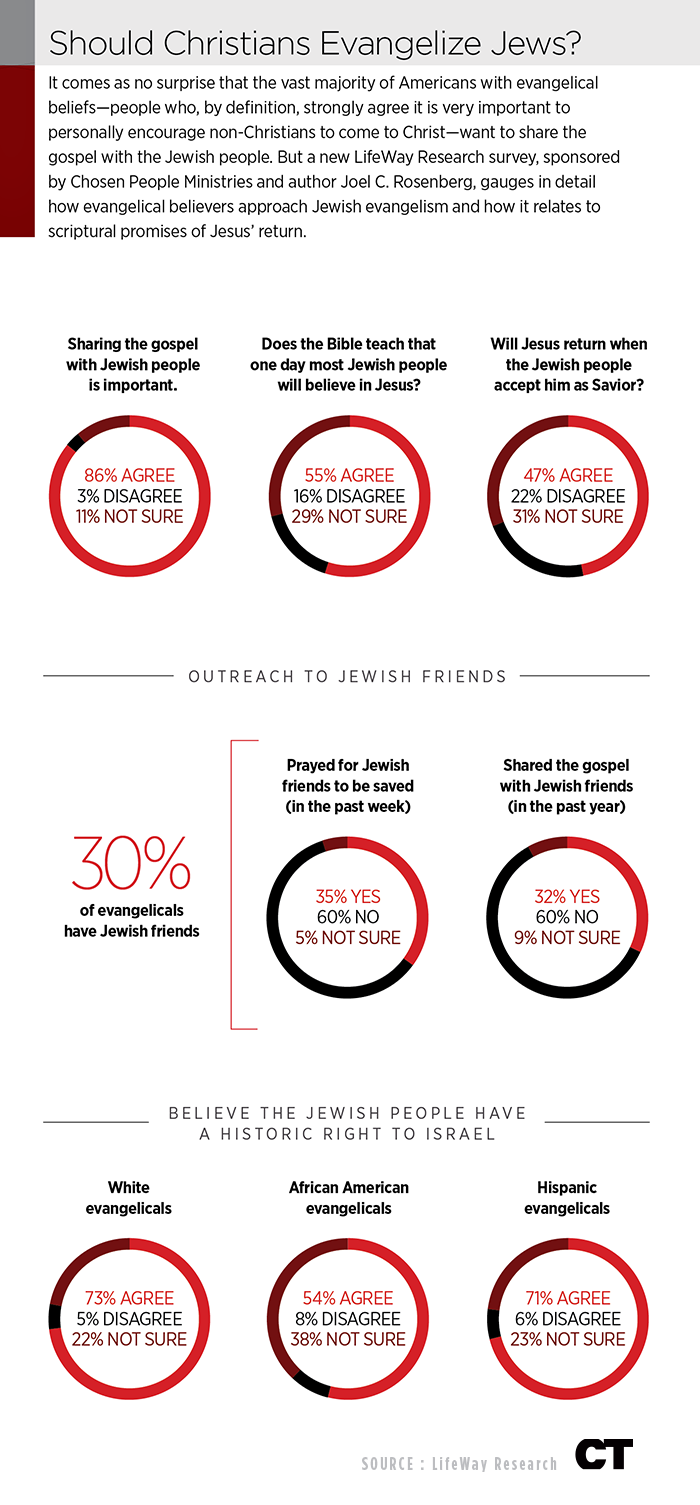The overwhelming majority of evangelical believers in the US today still see the importance of sharing the gospel with the Jewish community. But they’re less likely to agree on the relationship between Jewish evangelism and the end times, which once was a significant motivator of such outreach.
In a survey released today at the National Religious Broadcasters convention in Nashville, LifeWay Research found that 87 percent of Americans with evangelical beliefs agree that “sharing the gospel with Jewish people is important,” with just 3 percent disagreeing and 11 percent unsure [infographic below].
“According to the Great Commission, Jews need the gospel as much as everybody else and therefore should not be excluded from evangelism,” said Tuvya Zaretsky, president of the Lausanne Consultation on Jewish Evangelism (LCJE) and a longtime leader with Jews for Jesus.
As CT previously examined, the Lausanne Movement and the World Evangelical Alliance in 1989 endorsed the call to evangelize to Jewish people, rather than supporting a “two covenant” theology that views God as having his own covenant with the Jews, who therefore do not need to claim Christ. Many denominations agree, including the Southern Baptist Convention, the Presbyterian Church in America (PCA), and the Lutheran Church–Missouri Synod.
“The gospel is the only hope of salvation for all people, first proclaimed among the Jewish people, and nothing’s changed about that,” said Zaretsky, a Messanic Jew who came to faith in 1970.
“When Jesus spoke the words recorded in John 14:6—‘I am the way and the truth and the life. No one comes to the Father except through me’—he was speaking to a group of Jewish people at a Passover celebration. He didn’t make it exclusively for the Jews, but he certainly didn’t exclude Jewish people.”
Still, in the 21st century, Jewish evangelism can have social and historical baggage; even Christians who support Jewish evangelism theologically may be concerned about the backdrop of anti-Semitism, which pervaded the history of Christianity from the early centuries and culminated in the horrific event of the Holocaust (conducted in a nation which understood itself as Christian).
Chosen People Ministries, which sponsored the LifeWay survey along with author Joel C. Rosenberg, acknowledges how anti-Jewish teaching and rhetoric from the early church fathers to the American church has discouraged Jewish interest in Christ as the Messiah.
Two years ago, the Catholic Church released a statement explaining its stance that mission work targeting Jews, unlike engagement with other religions and worldviews, was insensitive and unnecessary. The Vatican stated:
The Church is therefore obliged to view evangelisation to Jews, who believe in the one God, in a different manner from that to people of other religions and world views. In concrete terms this means that the Catholic Church neither conducts nor supports any specific institutional mission work directed towards Jews. While there is a principled rejection of an institutional Jewish mission, Christians are nonetheless called to bear witness to their faith in Jesus Christ also to Jews, although they should do so in a humble and sensitive manner, acknowledging that Jews are bearers of God’s Word, and particularly in view of the great tragedy of the Shoah.
Bernard N. Howard, himself a Jewish believer and pastor of Good Shepherd Anglican Church in New York, reiterated the need for Jewish evangelism in a response at The Gospel Coalition.
“I certainly hope that Bible-believing evangelical Christians won’t go down the route of the Roman Catholic Church in steering clear of mission to the Jewish people,” Howard told CT. “I haven’t seen a momentum in that direction. … The danger is more of a case of a Gentile Christian being a little fearful of reaching out to Jewish people.”
Older evangelicals are most supportive of Jewish evangelism: 91 percent of those over 65 see it as important, compared to about 83 percent of Gen Xers and millennials (those under 50), LifeWay reported.
According to LifeWay, only 2 percent of evangelicals (measured by four belief statements) have a Jewish parent or grandparent, while 30 percent have Jewish friends.
Of those with Jewish connections, about a third have shared the gospel with their Jewish friends in the past year, while 60 percent had not. They were about as likely to have prayed in the past week for their salvation.
Jewish evangelism is “something that not necessarily every Christian should be actively engaged in, but I think it’s something every Christian person should take an interest in and help in some way,” Howard said, “even if that’s praying, making a regular donation to a Jewish outreach organization, or encouraging someone they know that’s engaging in the work.”
Today’s evangelical believers are mostly in agreement on the importance of Jewish outreach, but show less consensus over how those efforts relate to biblical eschatology and the modern state of Israel.
According to the survey, 55 percent believe that the Bible teaches that one day most Jewish people will claim Christ, while 47 percent believe Jesus will return when the Jewish people accept him as Savior. About 3 in 10 weren’t sure how to respond to either position.
Even evangelistic groups such as Jews for Jesus and LCJE include Christians with a “range of eschatological views” on such verses, Zaretsky said.
Some read New Testament passages as indicating conditions of Jesus’ return and God’s plan for salvation. For example, Romans 11:25-26 states, “Israel has experienced a hardening in part until the full number of the Gentiles has come in, and in this way all Israel will be saved.” And Acts 15:16-18 often gets cited for its mention of restoration and a “remnant.”
“I would encourage people involved in outreach to Jewish people to focus more on sharing the gospel now and perhaps a little less on speculative end times theology,” said Howard, who received Christ just a couple years after his bar mitzvah.
“I think that kind of dialing down on end-times theology is underway,” he said. “I hear it less about that than I used to, and probably it was at its height 30 years ago and has been on the decline since then.”
A majority of older generations—62 percent of evangelicals over 65 and 59 percent of evangelicals over 50—expect that all or most of the Jewish population will one day turn to Christ; however, fewer than half of those under 50 (47%) agree.
Over the decades, evangelicals have been drawn to Jewish evangelism by their end-times beliefs, their support for the state of Israel, and often a conflation of the two. Zaretsky pointed to the popularity of Hal Lindsey, a premillennial dispensationalist who saw the development of a Jewish state as part of God’s timetable for the second coming.
“Some Christians get caught up in the politics and don’t distinguish between Israel as a people—biblical, historical, global—and the political state of Israel,” Zaretsky said.
The Washington Post reported last month on the “long, uneasy love affair” between Israel and American evangelicals, referencing the unease among some Jews over evangelical missionary work and Messianic Jewish identity evolving into a greater openness toward their friendship and financial backing.
“Jews started to realize that they were friends of Israel, and then the Jewish community by and large became very myopic in their thinking,” Rabbi Yechiel Eckstein, founder of the International Fellowship of Christians and Jews, told The Post. “They are good for Israel, they are giving them money for their projects…. For a lot of Jews it was, let’s call it utilitarian.”
Americans with evangelical beliefs in particular continue to show strong support for the Israeli state: 73 percent of white evangelicals believe the Jewish people have a historic right to Israel, as do 71 percent of Hispanic evangelicals, LifeWay found. But only 54 percent of African American evangelicals believe the same.
As CT reported last year, Hispanic church leaders are increasingly rallying support for Israel, and the face of Christian Zionism is becoming more diverse.
Christians involved in Jewish evangelism point to the openness and opportunity among today’s Jews.
Because of increasing rates of intermarriage and shifting spiritual ties, Zaretsky said, American Jews have grown more receptive to the gospel message. A Barna Group survey the organization sponsored last year even found that 23 percent of Jewish millennials believe Jesus was God in human form.
“There is a phenomenal openness today among Jewish people, and I think the intimidation factor is an old impression,” he said. “They’re looking for God and real spiritual answers.”











